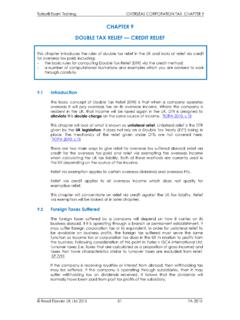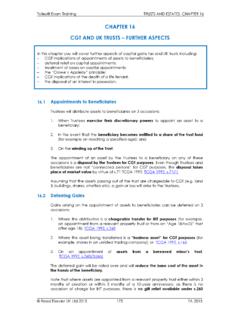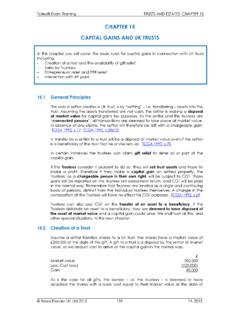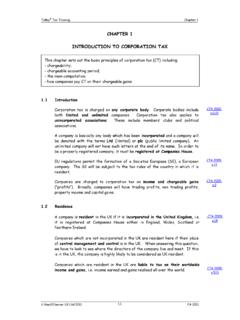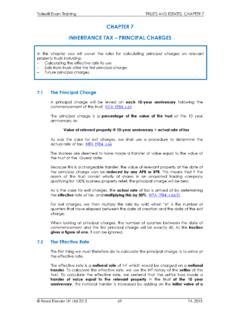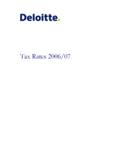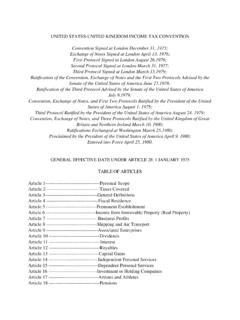Transcription of CHAPTER 23 ESTATES IN ADMINISTRATION - …
1 Tolley Exam TrainingTRUSTS AND ESTATES CHAPTER 23 Reed Elsevier UK Ltd 2015251FA 2015 CHAPTER 23 ESTATES IN ADMINISTRATIONThis CHAPTER will cover: The legal background to deceased ESTATES ; How the deceased is taxed in the year of death; How Executors pay tax on income during the ADMINISTRATION period; How beneficiaries pay tax on income from BackgroundExecutors are appointed by the deceased in the will. At the date of death, the assets of the deceased pass to the Executors. The Executors take legal ownership of the assets at the date of death, although this will be formally recognised once the Executors have obtained grant of Executors have a number of duties and responsibilities under English Executors must determine the assets and liabilities of the deceased at the date of death.
2 Must make application for probate. Application is made to the Probate Registry and gives formal recognition to the vesting of the assets in the Executors. Executors must collect the assets and ensure that all liabilities are settled. Executors must deal with HMRC, and settle all tax liabilities arising both as a result of death and in respect of income and gains made by the Executors during the ADMINISTRATION period. Executors must distribute the estate in accordance with the will of the deceased. Distributions are made to nominated beneficiaries of the estate .
3 Liabilities of the ExecutorsThere are a number of potential tax liabilities arising to the Executors as a result of of the first tasks will be to complete the deceased's income tax return covering the period from 6 April to the date of death. If any returns are outstanding for any previous tax years, it is the Executors' responsibility to arrange for these returns to be submitted and for the tax affairs of the deceased to be brought up to Executors will settle any income tax owed by the deceased for the tax year of death, and for any previous years if appropriate.
4 Any tax owed to HMRC at the point of death, is treated as a liability of the estate for IHT purposes. Therefore, the income tax returns must be finalised before the IHT liability can be correctly Exam TrainingTRUSTS AND ESTATES CHAPTER 23 Reed Elsevier UK Ltd 2015252FA 2015 The return will also include any capital gains in the year of death. Again, any CGT due is a liability of the estate for IHT. If any income tax or CGT is repayable to the Executors, the repayment is an asset of the estate and will be included within the IHT is the Executors' responsibility to arrange for payment of any IHT arising on the death estate .
5 The Executor will submit a form IHT 400, and the form will include a calculation of the IHT that the Executor is only responsible for settling any IHT due on the free estate . Tax on lifetime gifts within 7 years of death will be paid by the donees, although details of the transfers will be included in the IHT , any assets held on qualifying IIP trust will also be included in the IHT return, although the tax will be settled by the Trustees of the interest in possession IHT return, and the tax on the death estate , must be discharged before application for probate can be.
6 The Executors will submit tax returns giving details of any income and gains accruing to them during the period of ADMINISTRATION . Certain assets within the death estate will produce income. As this income legally belongs to the Executors until such time as the assets are distributed, the Executors will pay any income tax on this if the Executors sell any assets and make a profit, the Executors will have a CGT Year of DeathOne of the first tasks of the Executor will be to prepare the income tax return for the year of arising between 6 April and the date of death must be included on the deceased's tax return.
7 If the deceased had trading profits or, rents from a property business, the income should be calculated on an accruals basis. Death will be a cessation of trade for trading income purposes, so time apportionment of trading profits will be such as employment income, interest or dividends will be taxable on a receipts basis. Therefore any bank interest or employment income earned before death, but actually received after death, will be reflected on the Executors' return and will not be disclosed on the deceased's personal return.
8 It is therefore important that the correct income is allocated to the correct personal allowances are available in the year of death. Therefore if a taxpayer dies in the early part of the year, it is possible that taxable income may be covered by allowances and a tax repayment could return must also include capital gains for the period before full annual exemption is available for the year of death. If the deceased made capital losses in the tax year of death, these losses may be carried back for up to three years.
9 Such a claim may generate a CGT repayment which (in turn) would be included as an asset of the estate for IHT Executors' ADMINISTRATION period will start at the date of death. Any income and gains arising after the date of death will be included on the Executors' income Tolley Exam TrainingTRUSTS AND ESTATES CHAPTER 23 Reed Elsevier UK Ltd 2015253FA 2015tax return. This will include interest and dividends earned before death, but paid to the Executors after Tax During the ADMINISTRATION PeriodTax returns must be submitted by the Executors for the period from the date of death to the end of the ADMINISTRATION period may straddle more than one tax year, in which case returns are required for each separate tax ADMINISTRATION period comes to an end once the residue of the estate has been ascertained.
10 This is usually before the date on which the assets are finally distributed to the beneficiaries. The date the ADMINISTRATION period is completed will usually be the date to which final estate accounts are made Executors are bound by normal self-assessment rules , return are filed by 31 January or 31 October depending on whether the Executors choose to file electronically or non-electronically. The interest and penalty provisions are the same as for way we tax Executors on their estate income, is a relatively straight-forward exercise.
